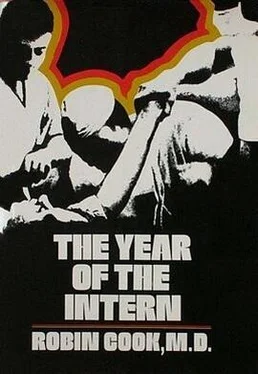The telephone rang. The moment was gone, and the skinny old man was back in my life. Jan lay down on the bed while I stood looking at the phone. My mind had been clear and well directed ten seconds before; now it became a jumble again, and with confusion came the terrible thought: He’s started breathing. I let the phone ring three times, hoping it would stop. When I answered, it was the nurse.
“Dr. Peters, the family has arrived.”
“Thank you. I’ll be right there.”
A sense of relief flooded over me; it was only the family. The old man was still dead.
I put my hand on the small of Jan’s back; her soft warm skin demanded attention, and the graceful curve of her back didn’t help me think how to ask the family for an autopsy. Finding my white shirt was easy, but the stethoscope eluded me until I stepped on it as I was putting the shirt on.
“Jan, I’ve got to run over to the hospital. I’ll be right back, I hope.”
Blinking, I stepped from the warmth of the room into the fluorescence of the hall, on my way to face the trial of the maroon elevator.
There is something ominous about the darkness and silence of a hospital asleep. By now it was ten-thirty, and the ward had slipped into the night routine, a kind of half life made up of soft lights and muted voices. I walked down the long hall toward the nurses’ station, past rooms marked only by the flow of night lights. At the other end, I could see two nurses talking, although no sound reached me. The hall seemed especially long this time, like a tunnel, and the light at the end reminded me of a Rembrandt painting, sharply bright areas surrounded by burnt umber. I knew that the calm could be shattered at any moment, driving me forward to face some new crisis, but for the moment that world stood still.
Autopsy. I had to ask for an autopsy. I remembered my first one, in the second year of medical school at the beginning of our pathology course, when I still thought medicine made everybody well. “File in here, men, and group yourselves around the table.” We had all looked the same in our white coats, marching in like well-behaved school children, which I suppose we were. And then I had seen her, not the one we were there to see, but another one, on the next slab, who was next in line to be autopsied. Her skin was a cold yellow gray, with a pox of herpes zoster extending from the right arm over the breast to the midline. Herpes zoster is a very serious and vivid skin disorder characterized by large crusted lesions. Its visual effect had been doubly startling in those surroundings. The woman lay on a cement table amid a thousand foul stains. Water flowed under and around her down longitudinal channels about three inches apart, falling into a drain at the base with an obscene sucking noise. Some scratchy pencil marks had been made on a manila tag tied around her right arm. Her hair looked brittle. But the thing that had bothered me most was the sickly color of her skin. About thirty, not much older than I am, I had thought. The sight had made me feel not physically ill, as a few of the med students did, but somehow mentally bankrupt.
She was undeniably dead, really dead, and yet she looked so alive except for the color. Dead, alive, dead... those words, absolute polarities, had seemed to fuse in my mind. The body I had dissected in first-year anatomy hadn’t been anything like this. It had been dead and hadn’t even suggested being alive. It’s the surroundings that make it bad, I had told myself, the crumbling dirty-gray room and the half-light, itself seeming foul and decayed as it struggled through grimy windows. What the hell do you want, Peters? A velvet bier, candles, and roses?
But that woman wasn’t the patient we had come to see. I had pressed in among the white coats grouped around another examining table, and had caught glimpses of fleshy organs and heard gurgling noises as the pathology professor cut away, demonstrating his technique. I hadn’t been able to see enough to appreciate the lesson, and, anyway, what had interested me was back over my shoulder. Everybody else had been transfixed by those organs; I couldn’t stop looking at the wrong body. I hadn’t wanted to touch her, but I had, and finding that she wasn’t very cold had only made it worse. I hadn’t been shocked anymore, just scared, and not because I had touched her but because she was slapping me in the face with the elementary fact that the difference between life and death was a matter of time and luck. Neither meant anything to her now. Scared, too, because she had been a young woman, perhaps desired and full of possibility, and now she was dead and yellow, lying on a stained cement slab in a dirty subterranean room. It was one thing to deal with sex when it hummed with life, warmth, and vigor. But I couldn’t deal with this. My jumbled mind had registered a hundred thoughts; sex had undeniably been among them, my own memories of sexual love.
That had been a long time ago and six thousand miles away. Right now, I had to deal with the skinny old man’s autopsy. “The family is over there, Doctor, on the couch,” said one of the nurses when I reached the ward reception area. Two people seemed to appear suddenly where none had been before. As we approached each other, the word “autopsy” kept bringing back that brittle hair and herpes zoster. Maybe I should call it a “post-mortem”; sounds better.
“I’m sorry.”
“It’s all right, we expected it.”
“We would like an autopsy.” The word came quite naturally, after all.
“All right, it’s the least we can do.”
The least we can do? It puzzled me that they felt they had to do anything at all. I had felt rotten enough being the one to call them so late at night and say that their father was dead, and now I felt even more guilty asking for the autopsy permission. But apparently they felt guilty, too. Since no one can be blamed for death, everyone shares the guilt. The least we can do? I was making too much of a simple comment. What response had I expected from them? Accusations? Tantrums? Most people, I would learn, are simply struck numb by death and carried along by their ordinary, civil, reflexive behavior.
“We’ll take care of the rest of the paper work, Doctor,” one of the nurses offered.
“Thank you,” I said.
“We appreciate what you’ve done, Doctor,” said the son as I stepped away from the nurses’ station.
“You’re welcome.” Nice people, I thought, walking away, and how lucky for me that they can’t read my thoughts. Even now I felt an urge to go groping over the dead man’s body for a pulse. If they knew my secret fear, would they be angry or just shocked? Shocked at first, probably, and then angry. But what would they think if their father woke up in the morgue? At that I smiled to myself, for of course hardly anybody gets taken to the morgue nowadays. Most go to a funeral home. Too many TV programs and bad movies. I was a fool, I mused, especially when I was tired, and at this point I was exhausted.
“Doctor, the phone is for you.” The voice came after me as I was almost to the end of the dark hall. It must be Jan, I thought, and remembered suddenly how good she had looked standing naked in my room. Her image fused with the autopsy room in medical school, with that yellow body and the herpes zoster on the breast. But the call wasn’t from Jan; it was from Ward A — another frantic nurse. Something about somebody’s venous pressure going to zero. The skinny old man’s son was still standing there. I caught his eye one last time, for an instant, and I suddenly felt proud to be there, and then foolish at my pride. Running the other way down the hall, I thought my situation was anything but glorious.
Venous pressure? My knowledge of it consisted of a dutifully memorized definition: “Venous pressure is the resting pressure in the large veins of the body.” Other than that I knew almost nothing. Regardless, I rushed headlong, as if I knew everything. That was my job.
Читать дальше












